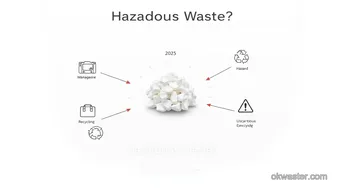Does Calcium Chloride Cause Hazardous Waste? | Complete Guide [2025]
Explore whether calcium chloride causes hazardous waste and learn about its environmental impact. Discover eco-friendly alternatives for sustainable living.

Does Calcium Chloride Cause Hazardous Waste? | Complete Guide [2025]
So, I was cleaning out my pantry the other day (you know, one of those rare adulting moments), and I stumbled upon a bag of calcium chloride. It got me thinking—does calcium chloride cause hazardous waste? I mean, it’s in everything from food to de-icers, but what happens when we’re done with it? Let’s break it down.
What Is Calcium Chloride Anyway?
Calcium chloride is this super versatile chemical compound. You’ve probably seen it as a drying agent in those little packets that come with shoes or electronics. Or maybe you’ve used it to melt ice on your driveway during winter. Heck, it’s even used in some foods (like pickles!) to keep them crunchy. But here’s the thing—while it’s super useful, its disposal can be a bit tricky.
Is Calcium Chloride Considered Hazardous Waste?
Okay, so here’s where things get interesting. Technically, calcium chloride itself isn’t classified as hazardous waste by most environmental agencies. But—and this is a big BUT—it can become problematic if mixed with other chemicals or disposed of improperly. For example, if you dump a bunch of calcium chloride into water sources or soil without care, it can mess with ecosystems and harm aquatic life.
I remember once trying to clean up spilled calcium chloride after an icy winter mishap (don’t ask). I just tossed it into the trash without thinking twice. Later, I learned that while small amounts are generally safe for regular disposal, larger quantities might need special handling depending on local regulations.
How Should You Dispose of Calcium Chloride?
Here’s the deal: always check your local guidelines first! Some areas treat calcium chloride differently based on how much you have and how you use it. For household amounts (like those tiny desiccant packets), tossing them in the trash is usually fine. But for industrial or large-scale use? That might require contacting a waste management service to ensure proper disposal.
Pro tip: If you ever spill calcium chloride indoors (like I did), don’t panic! Just sweep or vacuum it up carefully and dispose of it according to local rules. And hey—avoid dumping large amounts down drains unless you want potential plumbing issues later.
Environmental Impact: What You Need to Know
Let me tell ya’, this stuff isn't exactly eco-friendly if handled poorly. When too much calcium chloride gets into soil or water systems, it can increase salinity levels and harm plants and animals over time. So yeah—while "does calcium chloride cause hazardous waste" might not be a straightforward yes-or-no question, its impact definitely depends on how we handle it.
In conclusion? Be mindful when using and disposing of calcium chloride! It's not inherently dangerous as waste material but treating irresponsibly could lead us down an environmentally messy path...and nobody wants that kind o' drama!
There ya go! A quick guide packed with personal anecdotes because honestly who doesn't love learning through relatable stories?! Stay safe out there folks – both yourself AND Mother Earth will thank ya’.
Understanding Calcium Chloride and Its Impact on Hazardous Waste
What Is Calcium Chloride and How Is It Used?
Calcium chloride is a versatile chemical compound that pops up in more places than you might think. From melting ice on winter roads to keeping your cheese firm, it’s everywhere. In industrial settings, it’s used for dust control, concrete acceleration, and even as a drying agent. I remember the first time I saw it in action—my neighbor was sprinkling it on his icy driveway like magic powder. But with great power comes great responsibility, right? That got me thinking: does calcium chloride cause hazardous waste when used or disposed of improperly?
Does Calcium Chloride Meet the Criteria for Hazardous Waste Classification?
According to the EPA, hazardous waste has specific traits like toxicity, reactivity, or corrosiveness. So, does calcium chloride fit the bill? Well, not exactly. It’s generally considered safe when handled correctly. However, if mixed with other chemicals or dumped irresponsibly, things can get messy. Testing methods like pH checks and solubility tests help determine its safety level. Honestly, I learned this the hard way after spilling some in my garage—turns out it can corrode metal over time! Lesson learned: always read the label.
Environmental Impacts of Improperly Disposed Calcium Chloride
Here’s where things get serious. If calcium chloride ends up in soil or water systems unchecked, it can wreak havoc. Soil contamination affects plant growth (RIP my tomato plants), and water pollution harms aquatic life—think fish struggling to breathe because of altered oxygen levels. Ecosystems are delicate; one wrong move can throw everything off balance. It’s like dropping a pebble in a pond—the ripples spread far and wide.
Safe Handling and Disposal Practices for Calcium Chloride
So how do we avoid turning this handy chemical into an environmental nightmare? First off, store it in airtight containers away from moisture (trust me on this one). When transporting large quantities, follow DOT regulations to prevent spills or leaks during transit—no shortcuts here! For disposal? Check local guidelines; some areas allow recycling while others require special treatment facilities.
Alternatives to Calcium Chloride for Reduced Environmental Risk
If you’re looking to go greener (and who isn’t?), there are alternatives worth exploring! Beet juice-based deicers work surprisingly well without harming plants or waterways—plus they smell kinda sweet! Magnesium chloride is another option that’s less harsh on surfaces but still effective at melting ice safely without raising questions about whether calcium chloride causes hazardous waste . Every small switch adds up toward protecting our planet!
Previous article: Zero-Waste Basics: Simple Tips for Sustainable Living
Next article: Zero-Waste Kitchen Tips for Sustainable Living
Does Calcium Chloride Cause Hazardous Waste? | Complete Guide [2025]: Share, Rating and Comments

0.0 / 5
0 Review
